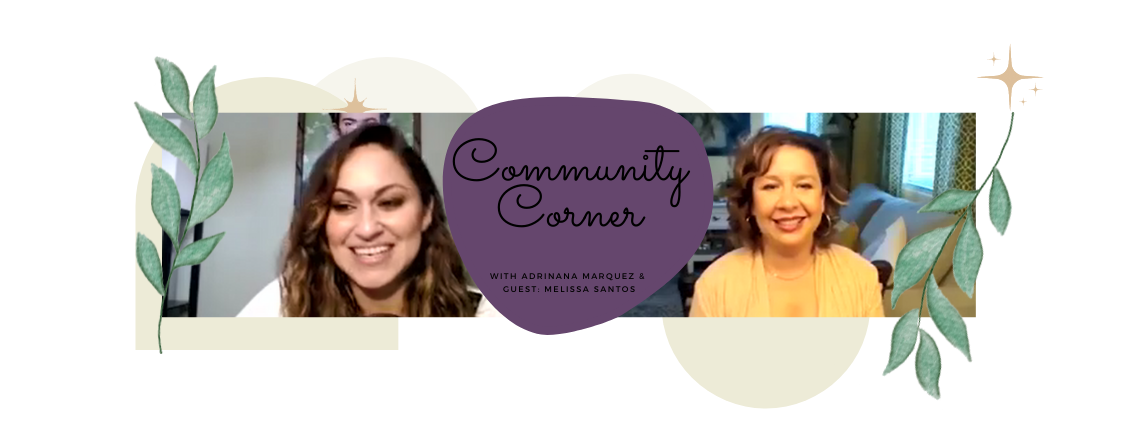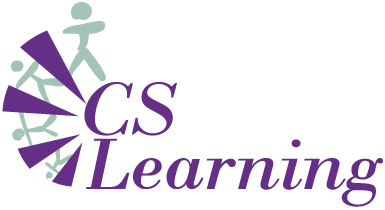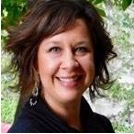August 2021
Pathways to Resilience: Learning to Trust Again—Even Yourself
Survivors of domestic violence are often left feeling a loss of a sense of self —less in charge of their life, less sure where they stand, even less able to trust their own instincts. As a longtime social work professional, Melissa Santos was well aware of the effects of trauma, but when intimate partner abuse came into her life, she found herself struggling. Community Solutions’ Adriana Marquez, host of the Solutions to Violence Community Corner, spoke with Melissa about her journey to reconnect with her inner strength and spirit.
To view the live Solutions to Violence interview, go here https://youtu.be/5nMpDjCuB2c
Community Solutions’ Adriana Marquez: Thank you so much for sharing your story. To begin, can you tell us when the abuse happened, and for how long? What were some of the barriers that were preventing you from leaving that relationship?
MS: It started about six years ago and went on for a couple of years. I remember feeling stuck and not in control. There was the manipulation and the emotional abuse that was happening, but also my fears, shame and embarrassment of allowing this in my life and my home. I thought I could somehow heal the trauma of my partner, control his alcoholism, and fix it. Looking back now, I think I knew from the very beginning (that it was not possible), but I was in denial. I’d been in social work for nearly two decades at the time—there was no way this could be happening to me.
And then it was not knowing how to get this person out of my life safely, because of all the threats. I had my six year old daughter home with me at the time. It was a lot to hold.
AM: Do you recall a specific incident that first made you consider leaving?
MS: We were away for a holiday weekend in traffic and there was an incident that triggered him and he started yelling at me, and my daughter was in the car. I asked him to get out of the car, and he called me names as he got out. He walked off and went into a bar and I drove off crying with my daughter asking me if I’m okay. When we got home, I remember the moment when I locked my daughter and myself into my bedroom. I had never felt unsafe in my home before.
Eventually he came home, and things weren’t good. He was banging on doors. That was the first time I called the police. That was the first night where I thought, “How did I get here? How am I letting this happen?” I remember the shame and guilt and blame, and feeling like I didn’t have any control to change it.
AM: I’m sorry that you went through that. When did you actually decide to leave?
MS: It took a bit for it to get to the end. The culmination came at the point where I was pregnant with his child. I had just chaired a successful charity event in town for a local foundation. He was there with me and began drinking, and the emotion of being seven months pregnant and all that comes with that, and then trying to control his drinking, all while doing a live auction—there were so many things. When we left the event, he couldn’t even walk straight, and when we got home he started going off on me. I said, you have to leave. He got angry and threw a bottle at me, and then an iron. Thank God it wasn’t hot, but he was trying to strike my stomach with it, it instead hit my forearm and neck. I managed to run upstairs and call 911.
The police took him that night and orchestrated an emergency restraining order. I was scared, exhausted and so unsure of what to do next. But the officers were fantastic and caring. One of them handed me some paperwork in case I needed support, and it included a brochure for Community Solutions. I was so taken aback to be holding the brochure. It made it real – I was a victim of domestic violence. I told the officer, “I’m a director at this organization.” He reassured me that this happens in all kinds of homes, all kinds of people. And truly, that’s what helped me leave. So while serving as an employee of Community Solutions, I also became a Community Solutions confidential client.
My advocate came to my house and we did what needed to be done so that the district attorney could file charges and a restraining order. I only had to go to court once. I think the reputation of our advocates and our agency is that if we’re there, it’s a real case. It’s the real deal.
AM: How was your mental health affected once you decided to leave? Sometimes people believe that once you leave, you feel free, everything is good now. Was that your experience?
MS: No, I was more scared when I left than I was when it was happening. But at least I felt in control. I knew where he was. How did it impact my mental health? Certainly depression and anxiety during the relationship. And then isolation. I’m usually a social person, house always open to friends, and love having people over for dinner. During that time I was making a lot of excuses not to do that kind of thing, and just wasn’t letting people in emotionally. I wasn’t talking about my relationship to my friends.
I was at risk for postpartum depression, too. I had gotten it with my first daughter, so I had put safeguards in place to try not to have it impact me as much the second time. But with all of this happening, I had perinatal mood disorder kick in before I even gave birth (distressing feelings that occur during pregnancy). And then it was deep depression, unable to eat or even get off the couch. Thank goodness my friends insisted on coming over for a 24/7 vigil. But, when I went to the hospital, he was there, so I didn’t let anyone in. I didn’t let anyone come see my newborn baby. The doctor and my daughter’s pediatrician and the nurses were all squeezing my hand and hugging me, whispering if I was okay. And I thought, my gosh, am I just really missing how bad this is? It must be really bad if people are noticing. So at that point it was depression and PTSD. Even now, if I see a vehicle that looks like the one he drove, every hair on my body stands up.
When I came back to the office a month later, I had lost a lot of weight because of the depression, and everyone said how great I looked. People expect you to show up a certain way in the world because that’s the way you’ve always been. When all this is going on internally, either from a domestic violence perspective or a mental health perspective, there’s nothing on your forehead that says, “Careful, I’m super depressed right now.”
As I reflect back, it shows where my healing needed to happen. It’s one of the reasons why I stayed in the relationship: the need for external approval. It’s great that I can show up in a room and bring joy, and most of the time it’s completely authentic. But it can also be a challenge for me because I can put that on even when it’s not what’s really going on. And, so part of my healing has been really coming into my authentic self and not having to seek external approval.
AM: Was it difficult to engage in other relationships without this trauma affecting you?
MS: It didn’t impact my trust in the world, which I’m grateful for. I have such a strong, spiritual grounding in knowing that things are always working out for me and that I was always going to be here in my current experience, and all those things can manifest on a daily basis. But it made it difficult for me to trust and have a relationship with myself because I should’ve known better. I teach across the country on alcoholism and on healthy relationships, I’ve been in the field for so long, and I let that happen to me. I worked for those two years to convince my inner being that this was fixable and this was the right place to be, and manipulated my own spirituality in some ways. So, really the relationship that impacted me the most was my relationship with myself.
AM: How did the pandemic help you work on trusting yourself again?
MS: Life stopped. Distractions stopped. Busy-ness stopped. I can fill a weekend agenda like nobody’s business, and every night of the week, and that doesn’t leave a lot of time for inwardness. I had already done a lot of work in therapy, and spiritually, and I felt somewhat connected to myself. But this past year (in the pandemic) just kind of stripped away all those distractions. You couldn’t hang out with anybody. And I’m horrible at phone relationships, even with my best girlfriends. So I wasn’t seeking approval and validation anymore, and I was able just to focus on myself and my girls and the two dogs that we rescued and adopted, and my home and my deepest desires. Grounded in gratitude, doing the meditation that I tell everybody to be doing in those mindful moments.
AM: If there is someone hearing you share your story who can identify or relate to what you were going through, what would you say to them?
MS: I would say that the inner voice is already telling them anything that they would want to know. My inner voice was already talking to me, and I would have ended things sooner if I had listened, if I had trusted the people around me that they weren’t going to judge me, that there wasn’t going to be shame.
Know that there is help, even if you have no support around you. There’s help, and it’s easy help. That feeling of stuckness doesn’t have to last long if you let others in. And be patient with yourself, because it may not work the first time. Tell one person, let one person in, just so that you have that trusted person to reach out to. And trust yourself.
___________________________________________________________________________________
Anyone can be abused, regardless of gender, age, sexual orientation, income level, race, religion or physical ability. NO ONE deserves to be abused. Community Solutions has many services to help residents of Santa Clara and San Benito Counties. For more information, please call our 24-hour hotline at 1.877.END.SADV (1.877.363.7238). If you or a loved one are in danger, please call 911 immediately.
Melissa Santos is passionate about breaking the stigmas that surround mental health, addiction and domestic violence. She seeks opportunities to bridge the gaps between communities and cultures and build empathy, understanding and resilience through the common experiences and trauma that bind us. Melissa is Senior Director of Strategy & Community Development at Community Solutions in Santa Clara County, CA overseeing internal clinical training, leadership development, community-based training and strategic initiatives.
She has over 20 years of experience in the behavioral health field and is a national trainer and CA Lead of the Celebrating Families!™ evidence-based curriculum for families impacted by addiction. Melissa has been a member of the Santa Clara County Touchpoints training team for over 10 years and facilitates training, conference workshops and webinars on trauma-informed care, mindfulness, recovery and organizational leadership throughout the country.
Adriana Marquez is the Program Manager of Solutions to Violence Prevention Program at Community Solutions and is the host of Community Corner that is produced weekly on Facebook Live where clients, advocates, and managers have shared their stories of resiliency and advocacy. She is the proud daughter of Mexican Immigrants who fostered her passion of helping the community. Adriana and her team are leaders in the fight against gender-based violence and providing culturally affirming support to survivors of domestic violence, sexual assault and human trafficking.





